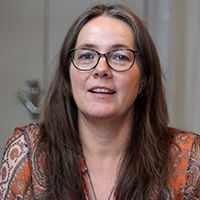Susanne Johansson: “The work we do together feels very meaningful!”
Shortly before CORE Organic Plus started, the funding bodies of the 22 participating countries appointed Susanne Johansson from Sweden as their new chairperson of the Governing Board. In the Interview, Susanne explains why Sweden has contributed considerable funds to CORE Organic Plus and how the heterogeneity among partner countries has become a creative driver.

Susanne Johansson, since nearly two years you are the chairperson of CORE Organic. What does organic agriculture and research mean for you personally?
For me, personally, it means taking responsibility for our planet and for the producers around the world where our food is coming from. It means to support the development of production methods, both on the farm level and further along in the food system, that are more and more sustainable as we gain more knowledge and experience through practising and doing research on organic production and consumption.
What are your tasks at Formas?
I’m a senior research officer at the Swedish Research Council for Environment, Agricultural Sciences and Spatial Planning, also known as Formas. My main areas of responsibility are agriculture, food and organic production and consumption. On the international arena I’ve been representing Formas and Sweden in ERA-net RURAGRI and joint calls with China.
Today I’m working in CORE Organic and SUSFOOD as well as supporting collaboration between researchers in Sweden and South Africa. I also deal with calls supporting collaboration between Swedish researchers and researchers in low-income countries on sustainable development and resilience.
With your insight into different ERA-nets, do you see some common challenges ERA-nets are facing?
There are of course challenges when all partners come in with very different national restrictions and regulations that they have to follow in our joint calls, but on the other hand there are a lot of things that we learn from each other as well and luckily the pros outweigh the cons at the end of the day. And I think that the commission and the whole ERA are learning from these experiences and evolve, as with the Plus and Cofund, to be more structured and “fair”.
What do you mean by more fair?
By "fair" I mean that the new rule from the Commission states that we have to strictly follow a peer-reviewed ranking list and thereby fund the best projects. We are not allowed to skip projects and go further down the list in order to use more of our allocated national funds. We are now able to use money from the Commission as a "real common pot" to fill the gaps if national funds of some countries are already spent. This I consider as "more fair" for the high-ranked projects that otherwise might have been left unfounded.
If you compare CORE Organic Plus with other ERA-nets: Do you observe specific characteristics of CORE Organic Plus?
I’ve heard CORE Organic being referred to as a dinosaur among the ERA-nets since we have existed as a network for so many years now. As a dinosaur we have a lot of experiences that I feel help us work quite smoothly. I feel that there is a lot of experience in CORE Organic Plus that I miss in other ERA-nets.
With around 1.6 million Euro, Sweden has allocated the highest amount of funds to CORE Organic Plus. What was behind that decision?
We had a peer review evaluation of research on organic production in Sweden a few years ago, both on scientific quality and on societal impact, and one of the main conclusions was that Swedish researchers should internationalise more. The research council has identified the participation in ERA-nets as a very efficient way to improve this. Of the 11 projects of CORE Organic Plus, Swedish researchers are participating in 8. This is already a first step, but of course we have to wait for the results before we can give a final conclusion.
The range of funds that the partners are able to contribute differs a lot. To what extent does this influence decision-making within the Governing Board?
The differences not only concern the available funds but also the current research needs in the different partner countries. I think that the representatives of the funding bodies have established an excellent culture of communication and negotiation to use the heterogeneity as a creative driver.
CORE Organic Plus will finish in 2019. What are the main goals you want to achieve till then?
I want to do my best to help making our work run as smoothly as possible in CORE Organic. The Governing Board is the brain of the ERA-net, and our meetings have to be “on target” and efficient, and that is the role of the chair. But this would not work without the heart of CORE Organic which is the coordinator ICROFS and their work together with all the supporting WP leaders, and I want to give this group a lot of credit. I would also like to see a new CORE Organic Cofund network set sail before then.
Any other question you would like to answer?
Well, if you were to ask me if I enjoy my work representing Formas and Sweden in CORE Organic I would definitely say “yes”. The work we do together feels very meaningful!
Interview by: Thomas Alföldi, FiBL
Contact person:
Susanne Johansson, susanne.johansson@formas.se
Forskningsrådet Formas / Swedish Research Council for Environment, Agricultural Sciences and Spatial Planning
Box 1206, SE-111 82 Stockholm, Sweden
Visitors: Kungsbron 21
Phone: +46 (0)8-775 40 20
Website: www.formas.se